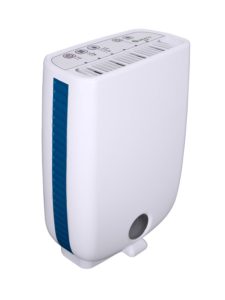Contents
Best Compressor Dehumidifier
What’s the difference between a a desiccant dehumidifier and a compressor dehumidifier? Choosing the best dehumidifier is slowly turning out to be rather tedious and hectic. Besides, different brands and companies are constantly trying to persuade customers to buy into their preferred technology.
How then do you differentiate one brand from another?
We have taken a keen interest in the topic and are going to provide you with a guideline of distinguishing these two dehumidifiers. The purpose of the guideline is to help you settle on the technology that best suits your needs, tastes, and preferences!
Understanding How it Works
Now, there are two types of dehumidifiers in today’s market. They are the desiccant dehumidifier and the compressor dehumidifier. Where then does the confusion arise? For someone who’s not familiar with any of these two types, choosing between them can be rather complicated. However, we have the right tips to show you how to get it right!

Compressor
Compressor dehumidifiers are the most popular systems. The majority of homeowners or customers prefer this type. It is, therefore, not so surprising knowing that they have been around for the last forty years! How then do they work?
They create a cold surface, and once the warm and damp air inside the room hits the cold surface, condensation starts, then the water separates from the air.
Desiccant
When it comes to a desiccant dehumidifier, there is no use of a cold surface while removing water from the air. Instead, it works just like a sponge!
An internal heating system then regenerates the desiccant for it to then repeat the cycle.
What do customers prefer? We discovered that because of the ease in mobility and relatively small form, the desiccant dehumidifier matches the needs of many clients. However, there are various factors also to remember when selecting between a compressor and desiccant dehumidifier. Some of these below should surely help.
Factors to Remember When Choosing Between a Compressor and Desiccant Dehumidifier
Level of Temperature
Let us begin by looking at the easy applications. For all environments which fall below the fifteen degrees Celsius mark, you should choose the desiccant dehumidifier. Why? Well, we are not trying to be biased, but we say this because of the mode of performance.
The air inside the compressor dehumidifier is required to be colder than that of the surrounding environment. In case the room temperature is too low, then that means that the compressor dehumidifier has to work harder to make the air within it colder.
Therefore, it’s important to bear in mind that the lower room temperature becomes, the more the air in the compressor turns to the freezing point!
Now, when it comes to room temperatures below fifteen degrees Celsius, the compressor dehumidifier is programmed to take up to two-thirds of the time defrosting instead of dehumidifying.
However, desiccant dehumidifiers have a consistent system or performance despite changes in temperature. The only exceptions are two types of desiccant dehumidifiers. These are the Meaco 20L Low Energy Dehumidifier range which do not perform below temperatures of ten degrees Celsius.
Keeping Your Home Warm and Dry
A majority of homeowners are looking for a dehumidifier that can keep their homes free from condensation. Of course, your home should be warmer than the temperatures mentioned above of ten and fifteen degrees Celsius. So which one should you choose?
Interestingly, the two types of dehumidifiers will slightly warm the air but don’t think that they can serve as heaters. No! Air gets warmer as it goes through the dehumidifier. In the desiccant dehumidifier, the air will be around ten to twelve degrees Celsius while in the compressor dehumidifier, expect air temperatures of close to two degrees Celsius. Quite a huge difference between these two devices!
If you prefer to keep certain parts of your home cool, nice and toasty, in this case, the compressor dehumidifier is the better choice. However, if you have parts of your home that are always chilly, then you should choose the desiccant dehumidifier as it produces more heat.
In a nutshell:
- For cold rooms, the winner is the desiccant dehumidifier
- For warm rooms, choose the compressor dehumidifier
Low Energy Consumption
In truth, the compressor dehumidifiers are generally cheaper to run than the desiccant dehumidifiers. The problem arises when the months of winter kick in and the snow is at your doorstep. Won’t a little bit of warmth make things more comfortable for you and your family? Choosing a desiccant dehumidifier means that you will get water and more energy for every extra coin you put in its purchase.
You now have an important decision. Do you choose the dehumidifier that’s cheaper and easier to run? Or do you want or need the warmth of the desiccant dehumidifier?
Low Noise Level

The desiccant dehumidifiers have a fan noise of around 40 decibels. However, very few compressor dehumidifiers have noise levels below 40 decibels. The only exception is the Mitsubishi electric range. For the most part, the compressor and the desiccant dehumidifier have similar noise levels. So what then separates the two?
It’s important to note that desiccant dehumidifiers often give you the option of switching to a lower mode. Sadly, the same ‘privileges’ are not available for compressor dehumidifiers!
Conclusion
Above are some of the important differences you need to consider when choosing a dehumidifier. What’s clear is that the desiccant dehumidifier is the better option. It is less bulky, produces water and heat at the same time. Pick out the best dehumidifier that aligns itself the best with the problems you’re facing in your home.
Best Compressor Dehumidifiers
Other Top Picks from Compressor and Desiccant:




